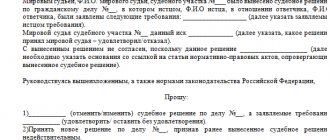We recently completed a case in which we defended the interests of a client whose ex-husband, some time after alimony was awarded, began receiving “salary in an envelope.” The main component of success in such cases is a well-chosen evidence base.
Although the icing on the cake of our position was the monologue of the defendant himself about his salary of 20 thousand rubles (in Moscow), although he came to court in an expensive suit, with an expensive watch and the latest model telephone. His high standard of living was simply striking.
Why his lawyer didn’t warn him not to do this remains a mystery to us.
Is it possible to request a report on child support?
The payer may demand a report on alimony from the recipient, but the woman has the right to refuse. No law obliges the recipient to report, but at the same time he is obliged to spend money only on the child: to buy food, clothing, shoes, school supplies, etc. (Article 60 of the RF IC).
If alimony is large (for example, 100,000 rubles), claimants often spend it on themselves. This is wrong and illegal: the money should be directed exclusively to the needs of children. Even if the recipient refuses to report, the payer has another option.
Changing children's place of residence
Using this method, the father will be able to put full control over maintenance issues. The procedure for changing the place of residence of a minor is provided for in Art. 65 RF IC. To take advantage of this opportunity, the father must send a statement of claim to the district court at the location of the ex-wife.
The success of the proceedings will depend on the following factors:
- living conditions of the parties;
- financial situation of the mother and father;
- social living conditions with each parent (presence of offenses, bad habits);
- the child’s opinions if he is 10 years old;
- positions of the guardianship and trusteeship authority;
- relationship between parents and minor.
Judicial practice follows the path of satisfying requirements regarding a change of place of residence for children under 14 years of age only in the event of antisocial behavior of the mother. The plaintiff will have to prove such facts.
Fact
If the case is won, the mother will have child support obligations.
Procedure for inappropriate spending of alimony
If you file an application with the court and specify in the requirements the provision of reports by the defendant, the claim will be denied.
There is only one reason: the laws do not require reporting. There is another option - opening an account in the name of a minor child. The statement of claim must indicate a requirement to transfer 50% of payments to the bank. The remaining portion will go to the ex-wife in the same manner. If alimony was collected previously, a request is submitted to change the method of payment.
However, to do this, the man must prove that 50% of the alimony is enough to provide the child with the usual standard of living. In addition, the mother then has the right to contact the guardianship department and obtain permission to use the child’s money without the father’s consent.
If you really have enough money, you need to go to court. The father cannot independently decide to transfer alimony to the account if there is no alimony agreement and the recipient refuses to enter into one.
The procedure for applying to court to transfer payments to the child’s personal account:
- Send a statement of claim with documents to the defendant.
- Submit documents to the district or city court at the defendant’s address.
- Come to the court hearing.
- The payer collects evidence indicating misuse of alimony. These can be receipts, checks for expensive purchases, vouchers, tickets, etc. It is important to consider that this is only indirect evidence. If possible, it is recommended to find witnesses who can confirm that alimony funds are being spent for other purposes. This is indirectly indicated by the situation when, with a small salary, the ex-wife allows herself expensive things.
- If the spouse cannot prove the proportionality of the expenses, the court may decide to transfer part of the funds to the child’s account, but not more than 50% of the amount to be paid.
Contents and sample application
What you need to indicate in the application:
- Name and address of the court.
- Full name, address, telephone number of the plaintiff.
- Full name, address of the defendant.
- Details of the document on the basis of which alimony was collected.
- Form and amount of alimony.
- New payment amount: for example, 25% goes to the defendant, and another 20% goes to the child’s bank account.
- Description of submitted documents.
- Date and signature.
Sample claim
Documentation
When going to court you will need:
- Statement of claim.
- Passport.
- Judgment, court order or alimony agreement (if any).
- A document confirming receipt of the claim by the defendant: for example, a receipt.
- Receipt for payment of state duty (300 rubles).
Transferring child support to a child's bank account
What is the minimum amount of child support?
Claim process
In the process of considering a claim, it is of great importance whether the ex-wife is obliged to account for alimony. If the notarized alimony agreement contains a reporting clause and the woman ignores the requirements, she may be held liable for violating the terms of the agreement.
Consideration of a claim in court does not guarantee satisfaction of the alimony claimant's demands. A decision will be made after reviewing the information provided. The court has the right to decide to transfer not 50% of alimony to the minor’s account, but a smaller part.
Report on alimony by payment method
If a man wants to receive spending reports from his ex-wife, he can negotiate with her on his own. It all depends on the basis on which payments are transferred.
An alimony agreement has been concluded
If the agreement is only planned to be drawn up by a notary, it is necessary to include in it a clause on the mandatory sending of monthly reports to the payer from the recipient. This is possible if the woman has no objections.
If there is already an agreement, you can include a separate clause on reporting by drawing up an additional agreement to it at the notary’s office. Both actions are possible only with the mutual consent of the parties.
Money is paid in cash
Often, alimony payers hand over money. You won't be able to request a report here—the recipient is not required to provide it. You can ask for a receipt for receipt of funds.
Important! A receipt must be required. If it does not exist, the alimony obligee has a chance to pay alimony again if the ex-wife files a claim to recover payments for the past period. In this case, you will have to transfer the entire amount for the last 3 years (Article 107 of the RF IC).
A receipt is not required if the money is transferred to a bank account and with each transfer the alimony payer writes in the comments a note “for alimony, with the child’s full name and payment period.”
Even if a woman decides to collect money for the past 3 years, after providing a bank account statement, the court will side with the defendant.
Alimony collected through court
To collect alimony in court, the woman with whom the children are left files a claim. Based on the results, a court decision is drawn up and a writ of execution is issued containing the following information:
- payer and recipient data;
- amount of alimony;
- payment terms;
- indexing conditions.
There is no obligation to provide reports to the IL. Therefore, a man does not have the right to demand checks and receipts from his ex-wife if she refuses to provide them.
We prepare documentation for the court
The statement must not be unfounded. The plaintiff will have to prove his claims.
As evidence, you need to prepare:
- acts of inspection of the living conditions of a minor (drawn up by specialists of the district departments of guardianship, social protection or social teachers of schools);
- resolutions of the district KDN and ZP on bringing to responsibility for improper performance by the mother of her duties;
- a copy of the writ of execution for the collection of funds or a notarial agreement;
- written refusal of the ex-wife to confirm the targeted expenditure of funds (if any);
- certificates confirming that the child’s mother has credit obligations (at the request of the court);
- information about making large purchases (according to witnesses);
- certificates about the amount of income of the plaintiff and the amount of assistance paid;
- other data proving the misuse of funds.
Important! Insufficient evidence will be the reason for refusal to satisfy the father's claims.
Responsibility for misuse of alimony funds
Family law does not provide for direct liability for improper spending of alimony for recipients.
If the alimony obligee believes that the money is being spent for other purposes, he can do the following:
- Deprive the mother of parental rights. Basis – Art. 69 of the RF IC (abuse of rights, improper performance of duties). The procedure is labor-intensive, deprivation is possible only on the condition that the guardianship authorities really establish that the child is not acquiring the necessary things, he is not eating well, has no clothes, etc.
- File a claim to determine the place of residence with the father. The court will take the plaintiff's side if a significant difference in financial and property status is established in his favor, and the mother does not fulfill her duties well.
If the child is over 10 years old, when changing his place of residence through the court, his opinion will be needed (Article 57 of the RF IC). If parents consider it unacceptable for a minor to participate in the meeting, it is not necessary to bring him.
In practice, it is almost impossible to deprive parental rights in this situation. Courts usually first restrict rights, and only then deprive them.
Examples
To understand the features of the procedure, it is enough to familiarize yourself with examples from practice:
An example of satisfying a claim. The couple divorced in 2015, leaving the woman with her 10-year-old son. The court ordered the man to pay alimony in the amount of 25% of his salary - 30,000 rubles. monthly. The average salary of the ex-wife is 12,000 rubles.
A year later, the payer noticed that his son did not have enough new clothes. The child also complained that his mother often refuses to buy him basic things and some school supplies are missing. Although 30,000 rubles. quite enough to provide for one child.
The man decided to buy all his son’s things on his own, but then decided to demand expense reports from his ex-wife, since he bought the child’s clothes and shoes himself. The woman refused to report, and then he began collecting evidence of inappropriate spending.
The payer discovered that the ex-wife had recently gone on vacation. The average cost of a trip is 70,000 rubles, which cannot be afforded with a salary of 12,000 rubles. Receipts for the purchase of an expensive dress in an elite boutique were also found.
This evidence is circumstantial and may well indicate that another man did the shopping for the woman. But the alimony obligee talked to his ex-wife’s neighbors and invited them as witnesses. At the trial, they confirmed that the woman herself had repeatedly said that she spent alimony on herself and mocked the payer.
The claims for the transfer of 50% of the alimony to the child’s account were satisfied.
An example of a claim being rejected. After the divorce in 2021, the man was ordered to pay fixed alimony - 10,000 rubles. His earnings from entrepreneurial activities range from 20 to 40 thousand rubles, the salary of his ex-wife is 15,000 rubles. She left with her 12-year-old daughter.
A year after the divorce, the woman began to go on expensive trips, buy herself good clothes, and her ex-husband decided that she was spending alimony on herself.
The man filed an application to provide the reports to the court. As evidence, he used vacation photos posted by the woman on social networks.
The claim was rejected because the photos are not evidence. In addition, her friend was invited to the meeting, who confirmed that he paid for all purchases.
Arbitrage practice
There are several other examples of real court decisions:
- The man wanted to change the form of payment from 1/4 to 1/6 of all types of earnings, and send 40% of the amount to the child’s account. By decision No. 2-449/2020 2-449/2020(2-6331/2019;)~M-7378/2019 2-6331/2019 M-7378/2019 dated February 7, 2021 in case No. 2-449/2020 the requirements were only partially satisfied: it was only possible to reduce the amount of payments in connection with the collection of alimony for another child.
- Initially, alimony was paid into a bank account, but the child’s father considered that the ex-wife was spending money on herself without permission from guardianship. He asked the court to change the form of payment to a fixed sum of money. By decision of May 23, 2012, the claims were denied.
Arbitrage practice
Plaintiffs are required to provide direct evidence that the alimony recipient spent the money transferred by the alimony provider not to meet the needs of the child, but for other purposes. Otherwise, the claims will be rejected, as in the case from practice, which was dealt with in the Slavyansky City Court of the Krasnodar Territory in March 2015.
The circumstances of the case were as follows: the plaintiff paid alimony based on a court decision. The monthly amount paid to them was almost 5 children's subsistence minimum for the Krasnodar Territory. In addition, the father indicated that the mother does not provide for his daughter because she does not have a job or other source of income due to being on maternity leave. Because of this, she could use this money to her advantage. To prevent this from happening, the father insisted on opening a personal account for the child and transferring half of the alimony allowance to him in the future.
At the same time, according to the plaintiff, the defendant refuses to write reports on expenses and make them available to him. The Magistrate's Court, resolving the case in the first instance, rejected the arguments of the application. The plaintiff did not agree with this and filed an appeal.
In response to the payer’s arguments, the appellate court rightly pointed out that the only reason why a change in the procedure for paying alimony is possible is the misuse of this money by the defendant. The applicant must prove this fact, but he has no evidence. Therefore, the magistrate's decision was correct and should be upheld.
Lawyer's answers to private questions
Can I demand from the court an accounting of child support expenses if they have already been collected by order?
No. You won’t be able to demand it; you can only negotiate peacefully with the claimant.
In what form is a child support report provided for the father?
Parents determine the form themselves. For example, these could be checks and receipts confirming expenses.
Where can I get a child support report for my father to confirm that he is paying everything?
A deduction sheet for enforcement proceedings can be ordered from the bailiff or the accounting department at the place of work.
Is a woman obliged to provide reports on alimony to bailiffs?
No, such an obligation is not provided for by law.
Alimony was collected for the maintenance of a former spouse caring for a child under three years old. Is she required to report where she spends her money?
No. Such alimony can be spent at your own discretion: for example, for partial payment for a vacation. No need to report.
Former Spouse's Reporting Responsibility
A significant percentage of alimony providers evade paying financial support for children. Persons who properly perform the duties of maintaining minors want to know where the transferred assistance is spent.
Alimony payments have a specific purpose. What can you spend child support on:
- food products, in accordance with the age and health status of the child;
- seasonal clothing and shoes;
- qualified medical care;
- summer recreation and recovery;
- additional education.
If there are suspicions that funds are being used for other purposes, the man can force the child’s mother to provide evidence (receipts or receipts for purchases made).
Deprivation of parental rights
The grounds for initiating this procedure are contained in Art. 69 of the RF IC and are specified in Resolution of the Plenum of the RF Armed Forces No. 10, adopted on May 27, 1998. These are associated with maternal antisocial behavior and include:
- alcoholism or drug addiction;
- marginal behavior (begging, prostitution);
- cruel treatment;
- lack of control over training and development;
The plaintiff will need to confirm the listed circumstances.
If the father's demands are met, then the son or daughter moves in with him. In this case, child support obligations will pass to the mother, despite the deprivation of parental rights.







